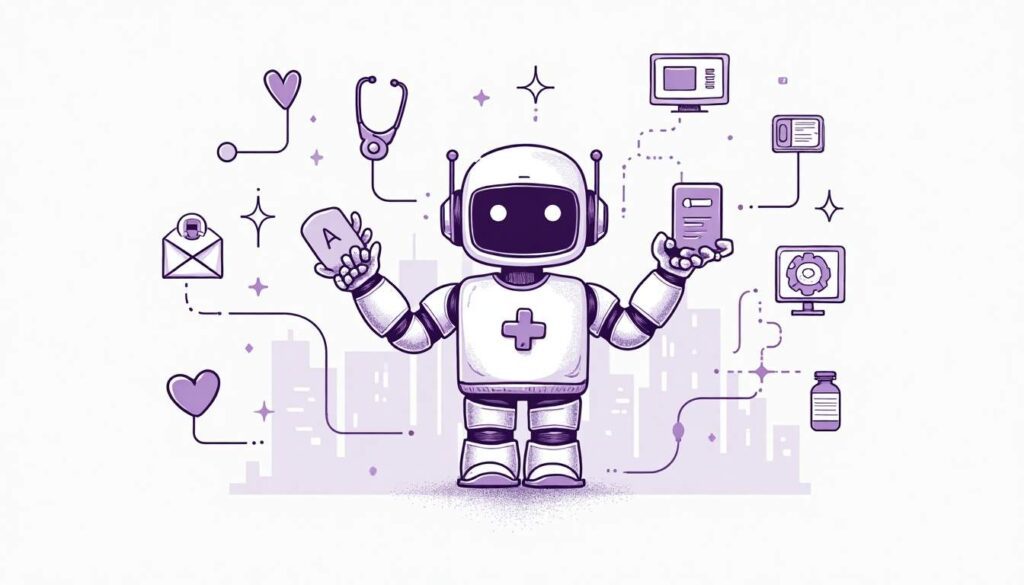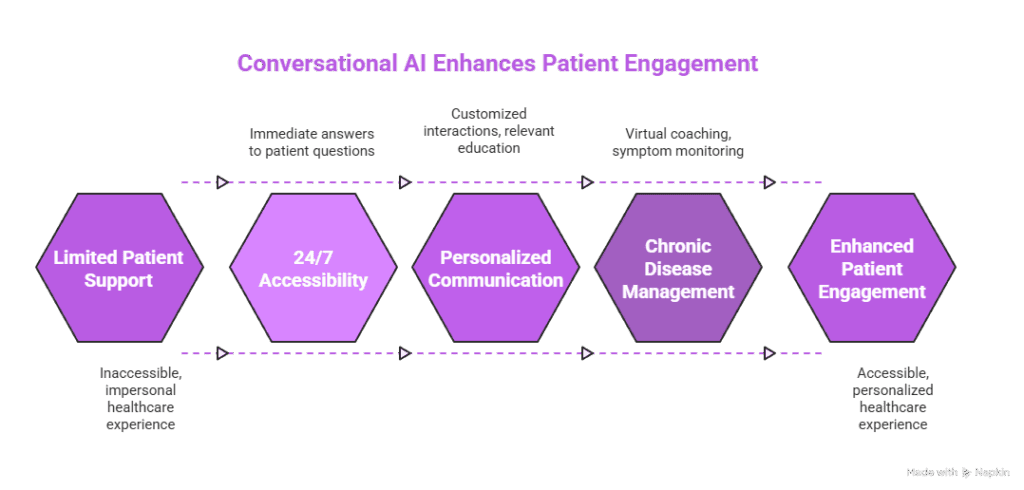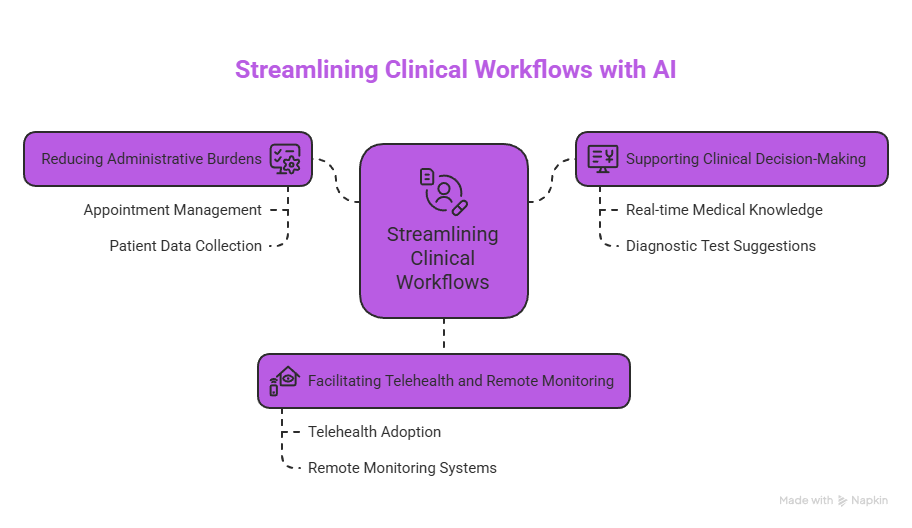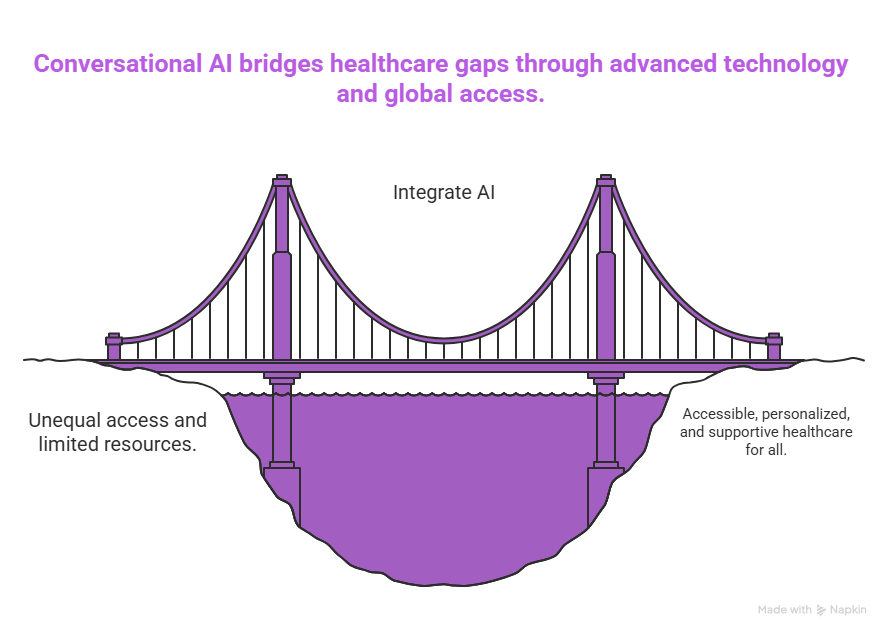Conversational AI in Healthcare: Revolutionizing Patient Engagement and Care
02 Aug 2025 By: Vlade Legaspi
Updated

Conversational AI in Healthcare is a transformative tool which revolutionizes patient care during the recent years. The technology allows patients to have immediate conversations with technological systems. The system improves provider-patient connections while speeding up medical services and monitoring health outcomes. This paper examines the various impacts of conversational AI on healthcare together with its advantages and challenges and potential developments.
Understanding Conversational AI and Its Role in Healthcare
What Is Conversational AI in Healthcare?
The healthcare sector employs conversational AI through tools which enable machines to understand and process human language in a natural way. The technology includes chatbots together with virtual helpers and voice recognition systems and NLP tools. The system employs machine learning and deep learning to analyze context and tone and intent which results in more dynamic and richer conversations. However, while these tools are powerful, they sometimes struggle to capture the warmth and empathy of real human communication. That’s where an AI humanizer comes in helping refine AI-generated text so it feels more natural, compassionate, and patient-friendly. This extra layer makes digital healthcare interactions more personal and trustworthy.
Healthcare applications of conversational AI enable patients to receive answers to their questions and scheduling appointments and personalized guidance and monitoring of chronic conditions. The human-like communication style of this technology makes it perfect for patient engagement because it requires empathetic and fast responses. A virtual health helper provides patients with symptom check guidance that indicates when they need medical attention or should handle their condition at home. The system enhances patient understanding while reducing unnecessary clinic visits so healthcare providers can attend to critical situations.
Why Conversational AI Matters in Healthcare
The healthcare industry operates under heavy patient volumes alongside insufficient medical staff and increasing expenses and individualized care requirements. Healthcare benefits from conversational AI through automated operations and enhanced communication and expanded medical services beyond traditional clinics. The system connects to EHRs to provide healthcare providers with immediate data which supports both quick and informed decisions and efficient workflow management.
Patient engagement shapes health results. AHRQ research shows that patient engagement leads to better treatment adherence and higher attendance at check-ups and better disease management. The quick personalized assistance from conversational AI tools helps patients develop good habits and increases their satisfaction levels. The practice of scheduled check-ins combined with reminder systems helps patients maintain their medication regimen and practice healthy behaviors. The system provides immediate access to mental health resources and coping strategies which enables users to maintain their emotional well-being.
Enhancing Patient Engagement Through Conversational AI

24/7 Accessibility and Convenience
The main benefit of healthcare conversational AI systems lies in their continuous availability to provide support. AI-powered chatbots and virtual assistants function as 24/7 resources which provide patients with immediate answers to their questions and concerns. The availability of these systems benefits patients who live in distant locations or have difficulties moving around.
A virtual assistant helps patients who have mild symptoms during nighttime hours to evaluate their health status and determine if they need emergency care or to book a future appointment. The immediate response system decreases patient anxiety while enabling them to choose appropriate actions without prolonged waiting periods. The natural language processing capabilities of these AI systems enable them to handle diverse inquiries which results in human-like interactions that avoid transactional feelings. The patient experience improves substantially because users tend to communicate through their own words instead of using complex menus or options.
Personalized Communication and Education
The use of conversational AI systems allows for customized patient interactions through the integration of individual profiles and medical records and personal preference data. The tools use data analytics and machine learning to provide personalized education about medications and lifestyle changes and disease management.
The system would send diabetic patients daily blood sugar level check reminders along with dietary advice and motivational messages to help them maintain their treatment plan. The delivery of personalized messages helps patients build stronger relationships with healthcare providers while motivating them to actively participate in their healthcare. The systems use patient feedback analysis to modify their messaging content which results in information that stays relevant and interesting. The systems’ ability to adapt their content makes both educational delivery and patient empowerment possible through increased patient involvement in their healthcare journey.
Improving Chronic Disease Management
The management of diabetes hypertension and asthma requires ongoing observation and personal health maintenance. Healthcare patients can receive virtual coaching through conversational AI systems to monitor their symptoms and maintain their medication plans and adopt healthier lifestyle choices.
Research indicates that AI-based care produces superior results for patients who have chronic conditions. The Journal of Medical Internet Research published research in 2023 which showed hypertension patients using conversational AI platforms achieved better blood pressure results than patients under traditional medical care. The tools let patients monitor their vital signs and track their medication schedule while receiving scheduled check-ins for progress updates and immediate feedback. The ongoing support system enables patients to prevent complications while staying actively involved in their healthcare. The analysis of extensive health data enables them to detect patterns and forecast potential risks which leads to early interventions that enhance treatment results.
Streamlining Clinical Workflows and Provider Support

Reducing Administrative Burdens
Medical staff spend considerable time on administrative work including appointment management and patient data collection and document preparation. The implementation of conversational AI technology enables the automation of many administrative tasks to enable clinicians to focus on providing direct patient care.
The implementation of AI-powered chatbots enables these systems to schedule appointments while sending reminders and gathering essential patient information ahead of appointments. The automation system decreases appointment cancellations while improving operational efficiency which produces better outcomes for patients. The automation of these operations enables healthcare facilities to allocate their resources better thus allowing them to treat more patients in less time. AI system data collection provides essential patient behavior and preference information that enables providers to improve their service delivery and enhance patient satisfaction.
Supporting Clinical Decision-Making
Through its conversational interface the system enables healthcare providers to obtain real-time medical knowledge alongside clinical guidelines together with patient data. Through EHR system integration virtual assistants offer diagnostic test suggestions and alert providers about potential drug interaction risks.
Through decision support tools clinicians can decrease errors while achieving better diagnostic precision while maintaining adherence to best practices. A 2022 survey conducted by the American Medical Association demonstrated that 65% of physicians utilize AI tools effectively to handle difficult patient cases. These decision support tools have become more sophisticated through AI development to process large datasets that helps both individual patient care and population health management by identifying patterns and making outcome predictions. The predictive features of this system enable better individual patient care and support proactive public health interventions to prevent issues from growing into major problems.
Facilitating Telehealth and Remote Monitoring
The COVID-19 pandemic has sped up telehealth adoption while conversational AI functions as a critical component of this transition. The system helps patients receive proper assessment before telehealth sessions while collecting their symptoms and giving instructions for post-visit care.
The integration of AI chatbots with wearable devices and remote monitoring systems enables vital sign tracking while alerting providers about potential health risks. The system’s continuous tracking capability enables healthcare providers to make prompt interventions and decrease hospital admission rates. The combination of AI technology in telehealth practice improves distant care quality while enabling patients to become more involved in their healthcare management. The use of conversational interfaces allows patients to receive personalized health advice as well as medication alerts and mental health assistance which leads to more involved patients who have better health understanding. The ongoing technological development will increase AI capabilities for improving patient-provider communication as well as care delivery streamlining which will lead to an efficient connected healthcare system.
Addressing Challenges and Ethical Considerations
Ensuring Data Privacy and Security
The privacy of healthcare data becomes a priority when using conversational AI because such applications raise significant security concerns. To protect patient information healthcare organizations must employ robust encryption methods and secure data storage solutions alongside HIPAA regulations compliance.
Healthcare organizations together with developers need to establish clear data usage transparency measures and strict access controls to build trust from their patients. The protection of healthcare data requires regular security audits and system updates which defend againstcyber threats. The use of blockchain technology with its transaction recording capabilities creates an unalterable system for patient data security which protects sensitive information from unauthorized access and tampering. AI system evolution will require ongoing education and training for healthcare professionals about data privacy best practices to establish a secure healthcare environment.
Overcoming Bias and Ensuring Inclusivity
Conversational AI systems acquire their knowledge through data analysis yet this process can sometimes preserve existing biases together with representation gaps. The quality of care can experience negative impacts when AI systems display different interaction behaviors across various demographic groups.
AI models need diverse training datasets together with ongoing fairness evaluation to solve this issue. Patient feedback together with inclusive design practices forms the basis for developing AI solutions that deliver equal quality service to all population groups. The combination of community organizations with advocacy groups provides essential knowledge about unique population requirements which helps AI tools achieve both technical excellence and cultural sensitivity. Developers should actively work with diverse communities throughout the design process to detect potential biases which enables them to build AI systems that promote health equity for all populations.
Maintaining the Human Touch
The efficiency and accessibility improvements brought by conversational AI do not replace the ability of human healthcare providers to deliver empathy and nuanced judgments. AI should function as an enhancement to human connection instead of replacing it.
Healthcare organizations must provide patients with simple access to human assistance during specific times and establish AI tools that correctly transfer complicated matters to human specialists. Incorporating an AI humanizer can help ensure these systems sound more natural and empathetic, maintaining a tone of care and understanding in patient interactions. Patient engagement success depends on finding the right combination between technological implementation and compassionate care. The growth of automated healthcare systems requires training programs that teach healthcare professionals about maintaining their interpersonal abilities. Healthcare organizations that develop strong communication abilities along with emotional intelligence among staff will achieve better patient understanding and health results despite technological advancements.
The Future of Conversational AI in Healthcare

Advancements in Natural Language Understanding
NLU and generation improvements will lead to more advanced conversational AI capabilities for medical dialogue processing. Future systems will be able to detect subtle emotional signals in conversations while processing multi-turn dialogues to generate responses that understand the context.
Such advancements will make AI interactions feel more natural and supportive, leading to increased patient trust and satisfaction. The AI system will identify patient anxiety and confusion to deliver appropriate responses for reassurance while maintaining clear explanations. The development of emotional intelligence in these systems will improve patient engagement because patients will sense better understanding and care from their healthcare providers. The systems will acquire the ability to customize conversations through vast patient interaction datasets which will result in personalized healthcare experiences for each user.
Integration with Emerging Technologies
Conversational AI will advance its capabilities by integrating with modern technological advancements that include augmented reality (AR) and virtual reality (VR) and advanced biosensors. Patients can receive guidance through AR technology for physical therapy exercises through virtual coaches who also offer instant feedback and motivational support.
Digital health interventions will experience expanded scope through such integrations because they create more immersive and personalized care approaches. A patient undergoing surgery recovery would use VR while interacting with conversational AI that delivers rehabilitation instructions within a soothing virtual world. The technology shows great promise for anxiety reduction while patients follow their treatment plans better. The use of biosensors to monitor vital signs enables conversational AI to offer customized support that matches the patient’s current health status through real-time data analysis.
Expanding Access to Global Healthcare
The healthcare gaps in underserved regions can be bridged through conversational AI which offers affordable and scalable medical information and support services. AI assistants which support multiple languages help deliver culturally adapted care to people from various populations throughout the world.
The combination of better infrastructure with advanced AI models will create essential tools for achieving worldwide health equity. AI serves as an initial contact system in rural areas where medical professionals are scarce to perform preliminary evaluations before referring patients to suitable resources. The use of mobile technology enables conversational AI to connect with people in distant locations thus providing essential health resources and support to all communities. The availability of healthcare resources to everyone will enable people to manage their health better while creating an educated population that achieves better results.
Across regions such as Australia, the United States, and the United Kingdom, tailored conversational AI solutions can address unique healthcare challenges while maintaining compliance with local regulations and meeting cultural expectations. In Australia, professionals seeking to enhance their AI and healthcare technology skills can explore Microsoft courses that cover data, AI, and cloud-based solutions relevant to building and deploying effective healthcare chatbots and virtual assistants. In the United States and the United Kingdom, there are Microsoft training programs that equip you with the skills to create secure, compliant, and culturally aware AI healthcare solutions helping make your healthcare capabilities globally prepared.
Trending Now!
The Global Conversational AI in Healthcare Market generated USD 13.53 billion in 2024 and analysts predict it will reach USD 48.87 billion by 2030 with a Compound Annual Growth Rate (CAGR) of 23.84%. The market expansion occurs because healthcare organizations need personalized care solutions and operational efficiency and cost reduction capabilities. Healthcare organizations use conversational AI systems including chatbots and virtual assistants and voice interfaces to manage appointment scheduling and patient inquiries and EHR integration and mental health support and telemedicine services. The combination of NLP and machine learning advancements enhances accuracy and contextual understanding which leads to better patient engagement and streamlined workflows and continuous accessibility. Virtual assistants have become the leading component segment because they automate routine tasks and offer customized health guidance to patients.
Healthcare providers use AI tools as their primary end-user segment because these tools help reduce administrative work while improving patient relations and enabling remote medical consultations. The growth of telemedicine and remote patient monitoring creates new opportunities to deliver healthcare services to underserved communities. The market leadership of North America stems from its advanced technological adoption and robust healthcare infrastructure and supportive regulations and substantial research and development investments. The market expansion will occur because healthcare providers are adopting AI solutions to enhance patient results and minimize expenses while providing better accessible healthcare services despite ongoing data privacy issues and regulatory compliance problems.
Conclusion
Conversational AI is revolutionizing patient engagement and care by making healthcare more accessible, personalized, and efficient. From enhancing chronic disease management to streamlining clinical workflows, AI-powered conversational tools are transforming how patients and providers interact.
However, realizing the full potential of conversational AI requires careful attention to ethical considerations, data privacy, and maintaining the human element in healthcare. With ongoing innovation and thoughtful implementation, conversational AI promises to be a cornerstone of the future healthcare landscape, improving outcomes and experiences for patients around the world.
HelpSquad Health allows you to begin experiencing the future of patient care through its current services. Experience the transformative power of conversational AI through our free trial or join us to discover how it will enhance your workflow and patient engagement while delivering better results at reduced costs.


